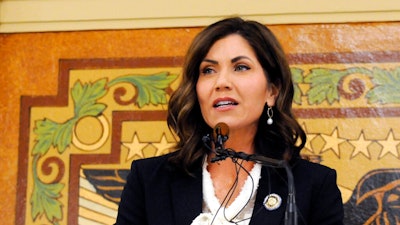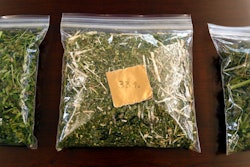
PIERRE, S.D. (AP) — South Dakota Gov. Kristi Noem on Monday vetoed a bill to legalize industrial hemp production in the state, saying it would make law enforcement's job more difficult and could be a first step to eventually legalizing recreational marijuana.
Noem had previously opposed legalizing hemp this year but had not threatened a veto. She raised a host of objections to the bill as it was being drafted.
"There is no question in my mind that normalizing hemp, like legalizing medical marijuana, is part of a larger strategy to undermine enforcement of the drug laws and make legalized marijuana inevitable," Noem said in a statement along with her veto.
Earlier Monday, the House voted overwhelmingly for the bill and sent it to her. But a 21-14 vote in the Senate fell short of the two-thirds support it would need to override her veto.
At least 41 states have enacted hemp growing and production programs, according to the National Conference of State Legislatures.
The bill's main sponsor, Democratic Rep. Oren Lesmeister, has said it would allow South Dakota farmers and ranchers to keep up with the demand and the expansion of the hemp industry.
Noem said she was worried that drug detection dogs flag hemp like marijuana and that the plants look alike. Her administration has said allowing hemp cultivation would come with a multi-million dollar price tag and lead to another push to legalize marijuana in South Dakota.
Wyoming Republican state Rep. Bunky Loucks, who sponsored a hemp legalization bill signed recently there, told the Rapid City Journal that a veto from Noem would mean less competition for the Wyoming hemp industry.
"Tell her I hope she vetoes it, because that would be good for Wyoming," he said.
Lesmeister said the Senate added "close to 90 percent" of a suggested amendment from the governor's office. The alterations include broader background check requirements, giving more rulemaking authority to state agencies and restricting who could transport industrial hemp. The changes also require hemp to be grown outdoors.
The 2018 federal farm bill legalized cultivation of industrial hemp nationally. Supporters contend planting hemp wouldn't even happen until 2020 under the South Dakota proposal, which defines industrial hemp as containing no more than 0.3 percent THC.






















